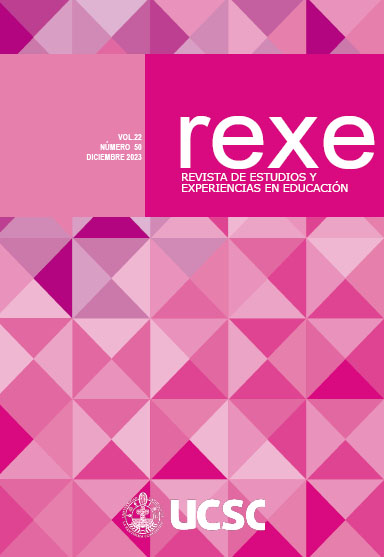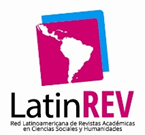Teaching in a Pandemic: Perceptions of Teachers
DOI:
https://doi.org/10.21703/rexe.v22i50.1867Keywords:
co-docencia, Pandemia, Educación a Distancia, Aprendizaje en LíneaAbstract
The article explores teaching work in the context of a pandemic. This study investigates the pedagogical capacities demanded during this period, the teaching requirements that emerge in the context of telework and the identification of the aspects that imply work pressure, which determine teaching challenges in this context. Under a quantitative approach, the study identifies behavior patterns by collecting primary information. This is achieved through the application of a questionnaire applied to a population of teachers in the territory under study.
From this, it is concluded that remote activities require changes in the teaching and learning strategies developed by the teacher. At the same time, adaptation is required to a context in which students and teachers see their daily lives affected due to the repercussions of the pandemic, which demand an adaptive response in a scenario of unpredictability and uncertainty. In conclusion, this study reveals the challenges posed by the teaching role in a pandemic, which overcome the perception that it is only about managing technological skills.
Thus, the need has emerged to clarify the training baseline aimed at appropriating ICTs, which, in turn, imply their significant use as educational tools. Finally, the requirement to prospect environmental conditions that would allow advancing the use of ICT with greater effectiveness is observed.
Downloads
References
Blanco, M. A., y Blanco, M. E. (2021). Bienestar emocional y aprendizaje significativo a través de las TIC en tiempos de pandemia. CIENCIA UNEMI, 14(36), 21-33. https://doi.org/10.29076/issn.2528-7737vol14iss36.2021pp21-33p
Brod, C. (1984). Technostress: The Human Cost of the Computer Revolution. . Massachusetts: Addison Wesley.
Buitrago, D. (2020). Teletrabajo: una Oportunidad en Tiempos de Crisis. Revista CES Derecho. 11(1), 1-2.
Cerveny, L. (2021). Teacher stress in response to the covid-19 outbreak in the spring of 2020 (Order No. 28263322). Available from ProQuest Dissertations & Theses Global. http://146.83.201.80/dissertations-theses/teacher-stress-response-covid-19-outbreak-spring/docview/2476843805/se-2?accountid=166654
Ferri, F., Grifoni, P., & Guzzo, T. (2020). Online learning and emergency remote teaching: Opportunities and challenges in emergency situations. Societies, 10(4), 86.
Fuglseth, S. (2014). The Effects of Technostress Within the Context of Employee use of ICT. Computers in Human Behavior, 161-170.
Huamán Ramos, L. ., Torres Inga, L. A. ., Amancio Anzuhueldo, A. M. ., & Sánchez Díaz, S. . (2021). Educación remota y desempeño docente en las instituciones educativas de Huancavelica en tiempos de COVID-19. Apuntes Universitarios, 11(3), 45 - 59. https://doi.org/10.17162/au.v11i3.692
König, J., Jäger-Biela, D., Y Glutsch, N. (2020) Adapting to online teaching during COVID-19 school closure: teacher education and teacher competence effects among early career teachers in Germany, European Journal of Teacher Education, 43:4, 608-622.https://doi.org/10.1080/02619768.2020.1809650
Cheng, L., y Lam, C.Y. (2021) The worst is yet to come: the psychological impact of COVID-19 on Hong Kong music teachers, Music Education Research, 23:2, 211-224.https://doi.org/10.1080/14613808.2021.1906215
Loziak, A., Fedáková, D., y Čopková, R. (2020). Work-related stressors of female teachers during COVID-19 school closure. Women's Entrepreneurship and Education, 2020(3-4), 59-78. https://doi.org/10.28934/jwee20.34.pp59-78
Mehta, P. (2021), "Teachers’ readiness to adopt online teaching amid COVID-19 lockdown and perceived stress: pain or panacea?", Corporate Governance, https://doi.org/10.1108/CG-09-2020-0385
Plamer, J. M., de Klerk, E. y Modise, M. A. (2021) Re-prioritizing Teachers’ Social Emotional Learning in Rural Schools Beyond Covid-19, Journal of Ethnic and Cultural Studies, http://dx.doi.org/10.29333/ejecs/563
Pozo-Rico, T., Gilar-Corbí, R., Izquierdo, A., & Castejón, J. L. (2020). Teacher Training Can Make a Difference: Tools to Overcome the Impact of COVID-19 on Primary Schools. An Experimental Study. International Journal of Environmental Research and Public Health, 17(22), 8633. https://doi.org/10.3390/ijerph17228633
Quiroz-Zambrano,G. y Vega-Intriago, J. (2020). El teletrabajo y su influencia en el bienestar emocional de los docentes en el periodo de confinamiento por el covid-19. Polo del Conocimiento, [S.l.], 5(12), 361-373. http://dx.doi.org/10.23857/pc.v5i12.2058.
Ribeiro, B., Scorsolini-Comin, F., y Dalri, R. (2020). Ser docente en el contexto de la pandemia de COVID-19: reflexiones sobre la salud mental. Index de Enfermería, 29(3), 137-141. Epub 25 de enero de 2021. Recuperado en 06 de noviembre de 2023, de http://scielo.isciii.es/scielo.php?script=sci_arttext&pid=S1132-12962020000200008&lng=es&tlng=es.
Rodríguez, J., Guevara, A., y Viramontes, E. (2017). Síndrome de burnout en docentes. En IE Revista de Investigación Educativa de la REDIECH, 8(14). http://www.redalyc.org/articulo.oa?id=521653267015
Tarafdar, M., Tu, Q., Ragu-Nathan, B. S., & Ragu-Nathan, T. S. (2007). The impact of technostress on role stress and productivity. Journal of Management Information Systems, 24(1), 301-328. https://doi.org/10.2753/MIS0742-1222240109
Tejedor, S., Cervi, L., Tusa, F., y Parola, A. (2020). Educación en tiempos de pandemia: reflexiones de alumnos y profesores sobre la enseñanza virtual universitaria en España, Italia y Ecuador. Revista Latina de Comunicación Social, 78, 1-21. https://www.doi.org/10.4185/RLCS2020-1466
Weil, R. (1997). Technostress: Coping with Technology@ Work@ Home@ Play. Chichester : John Wiley & Sons Inc.
Yévenes,A. (2021). Réplica a escala y expresión territorial del centralismo en educación. Revista Estudios en Educación (REeED), 4(6), 29–43.
Downloads
Published
How to Cite
Issue
Section
License
Open Access Policy
This journal provides immediate open access to its content, based on the principle that offering the public free access to research fosters greater global knowledge exchange.
License
The REXE Journal, “Journal of Studies and Experiences in Education,” published by the Faculty of Education at the Universidad Católica de la Santísima Concepción, is distributed under a License. Creative Commons Atribución 4.0 Internacional.






